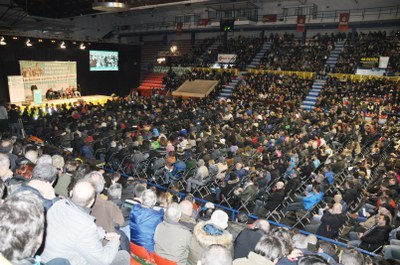Employers and the Basque Government are sharing a salary reduction strategy

Along with the Secretary General of ELA, Leire Txakartegi, Marikruz Elkoro, Igor Eizagirre and Unai Martinez, who are in charge of the executive board and of the federations, all intervened in the event held in the ‘La Casilla’ Sports centre, and they referred to the trade union’s campaign against work and social insecurity and the ILP against outsourcing that was rejected yesterday in the Basque Parliament.
Muñoz also insisted that work with starvation wages brings with it a more impoverished society and that “it is impossible to sustain some reasonable pensions with starvation wages”. He criticised the cut backs by Urkullu’s government to settle the deficit with a drop in revenue of 500 million euros. These cut backs have affected many public contracts. “Many workers are being forced to work in conditions of exploitation. They are being paid 5€ the hour”, he underscored.
Muñoz also referred to the nationalisation of collective bargaining and the effects of this. On this point he emphasised that for different reasons the nationalisation of collective bargaining is profitable for employers and the Basque Government, since it allows them to make important reductions in salaries.
He explained that in relation to the nationalisation, the PNV has played much worthier roles than the present one. “Today, unfortunately, they are encouraging the devaluation of salaries. This is the reason they are backing and applying nationalisation.”
In 1994, when another attempt was made at nationalisation, the PNV worked alongside the ELA, to prevent it. This was achieved and we knew how to value it. Today, 22 years on, it is not just that the PNV is not defending what it previously had defended, the fact is that now it is backing the idea that these disastrous agreements should be applied in Euskal Herria”.
In his speech, Muñoz referred to the need to strengthen the trade union in order to be effective in the companies, in social struggles and in political influence. “Without strength we are nothing. Our effectiveness will go no further than reporting this reality if we do not have a real base in the companies. Value must be given to the trade union and we must do it ourselves”, he underlined.
